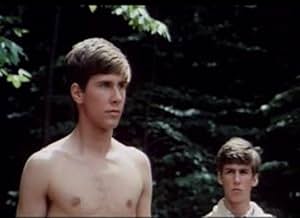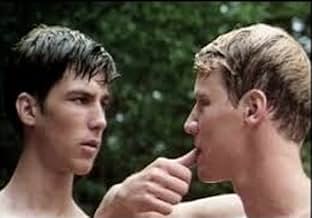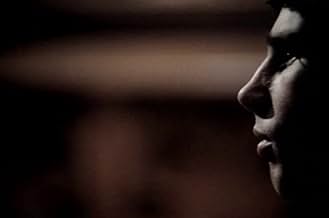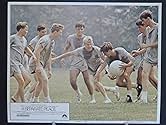Two roomates at a prep school in New England during World War II come to grips with the war, jealousy and betrayal. Based on a novel by John Knowles.Two roomates at a prep school in New England during World War II come to grips with the war, jealousy and betrayal. Based on a novel by John Knowles.Two roomates at a prep school in New England during World War II come to grips with the war, jealousy and betrayal. Based on a novel by John Knowles.
Falko Schilling
- Student
- (uncredited)
Steve Walker
- Student
- (uncredited)
- Director
- Writers
- All cast & crew
- Production, box office & more at IMDbPro
Featured reviews
As with many film adaptations, fans of the book can't but feel that they've been slightly cheated by the movie. The 1972 adaptation's faithfulness to the book can be commended, but it comes at a heavy price. The movie is so faithful that it was filmed at the boarding school, "Phillips Exeter Academy," that John Knowles attended and drew inspiration for the book from. The movie goes as far as to fill the cast, with the exception of Gene, with students and alumni who participated in the Academy's drama club. The actors' lack of experience shines throughout the movie and viewers are left with the notion to laugh. Lines, taken from the book, are delivered blandly and lack any emotion.
On positive thing that the movie brings to the table is the setting, being filmed at the boarding school where the book was "set" everything seems right. When they introduce the tree, you can't help but wonder if the novel's story is closer to non-fiction rather than fiction.
The movie makes an attempt to convey the symbolism found in the book, but without Gene's constant narration a viewer who hasn't read the book would find it very hard to grasp.
Although the movie makes an earnest attempt at greatness, the inexperienced cast, and low budget get in the way to frequently.
On positive thing that the movie brings to the table is the setting, being filmed at the boarding school where the book was "set" everything seems right. When they introduce the tree, you can't help but wonder if the novel's story is closer to non-fiction rather than fiction.
The movie makes an attempt to convey the symbolism found in the book, but without Gene's constant narration a viewer who hasn't read the book would find it very hard to grasp.
Although the movie makes an earnest attempt at greatness, the inexperienced cast, and low budget get in the way to frequently.
The 1972 film version of John Knowles modern masterpiece is a class act for the reason that Paramount Pictures went to Phillips Exeter Academy and filmed it on location with all student actors from Exeter with the exception of Parker Stevenson whom attended The Brooks School. Though the acting is a little amateurish,so what,it should be, for it is the drama society of the school and alumni putting on a Paramount Film!
John Heyl,a former Exeter Student, was eighteen and son of the school's doctor. John Heyl does a great job as Finny at the age sixteen,seventeen that Finny would have been in the novel. This was also Parker Stevenson, at eighteen, his first film and in my view his best role as Gene.
It is a good adaptation of the book but I would strongly suggest that you read the novel first for the tensions of love, hate,jealously, denial, sexual undertone, and regret are pale compared to John Knowles' writing.
It is a love story with war looming closer to the boys of The Devon Academy. The viewer decides if this love is emotional and / or physical. What else could motivate ones "Best Pal" and roommate to do such a violent act as to attempt to maim him hence excorise him (Finny) from Genes life i.e. emotions so deep that Gene could not deal with at sixteen.
I have recently viewed Showtime's 2004 version which was filmed at a college in Canada and has actors that are in there late twenties playing the parts of teenagers. No sorry - Veto! John Heyl will always be Finny and Parker Stevenson will always be Gene. The 1972 film version shot at Exeter is the true "Preppy Classic".
John Heyl,a former Exeter Student, was eighteen and son of the school's doctor. John Heyl does a great job as Finny at the age sixteen,seventeen that Finny would have been in the novel. This was also Parker Stevenson, at eighteen, his first film and in my view his best role as Gene.
It is a good adaptation of the book but I would strongly suggest that you read the novel first for the tensions of love, hate,jealously, denial, sexual undertone, and regret are pale compared to John Knowles' writing.
It is a love story with war looming closer to the boys of The Devon Academy. The viewer decides if this love is emotional and / or physical. What else could motivate ones "Best Pal" and roommate to do such a violent act as to attempt to maim him hence excorise him (Finny) from Genes life i.e. emotions so deep that Gene could not deal with at sixteen.
I have recently viewed Showtime's 2004 version which was filmed at a college in Canada and has actors that are in there late twenties playing the parts of teenagers. No sorry - Veto! John Heyl will always be Finny and Parker Stevenson will always be Gene. The 1972 film version shot at Exeter is the true "Preppy Classic".
Ok, I read the book too, but that was in - oh say- 1964 and I forgot it all. But the movie worked for me on its own merits. First of all, how many movies today are all about groups of 17 year old guys. Gone are the all-male schools and seminaries of the past. So it's a nice window onto a vanished (mostly, I think) subculture. Naturally someone in our own decade is going to read "homosexuality" into the relationships, but there was, in fact, a time when Finney could say to Gene "in this teenage period of your life, the best person to come to the beach with is your best pal, and we believed him. The cinematography was beautiful, even lyrical. I think the character of Finney was very well portrayed by John Heyl and wonder what ever happened to him. We know what happened to Parker Stevenson (he married Kirstie Alley). All in all, a succesful evocation of a time and place, whether or not it measured up to the themes and meanings of the book (which I note Leonard Matlin called "overrated" anyway.
The novel A SEPARATE PEACE is one of the benchmarks of American adolescent literature, second only to CATCHER IN THE RYE in terms of an accurate portrayal of 20th century young adult angst. The novel is a complex, ambivalent portrayal of friendship between two dissimalar friends at a stuffy New England boys' school during the opening years of WWII. The film version captures to a great extent the feel of the era and the New England setting, yet fails to really convey the conflicted feelings of Gene, the narrator in the book. The all-important scene in the tree is rendered in a murky manner; one not famililar with the book would be confused as to what had happened. And the confrontation scene in Phinney's house is poorly staged and interpreted. It's interesting to note that, with the exception of Parker Stevenson, none of these actors seem to have made good in their respective careers. Begs for a quality remake.
When I read this book some years ago it was because I was forced to read it in English class in High School. I grew up in the town where the book and movie were set, Exeter New Hampshire. Seeing the film brought back memories of my childhood in Exeter and all the visits I made to Phillips Exeter Academy, otherwise known as Devon in the book. The character development is much better in the book, but the movie does do the book some justice. This movie is a must-not miss and should always been shown to a child growing up.
Did you know
- TriviaThe scene where the boys all suddenly start singing "Hitler has only got one ball" was unscripted. Director Larry Peerce continued filming to see how it played out, with the scene ending up in the final cut.
- How long is A Separate Peace?Powered by Alexa
Details
Box office
- Gross US & Canada
- $921,268
- Runtime1 hour 44 minutes
- Sound mix
Contribute to this page
Suggest an edit or add missing content






















